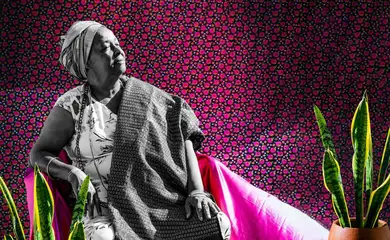Black movement rises against police violence throughout Brazil

In the wake of a series of police operations that have resulted in dozens of deaths over the last few weeks, black movement organizations held unified protests across Brazil on Thursday (Aug. 24). The date also marks the 141st death anniversary of lawyer and abolitionist Luiz Gama, a leading figure in the fight for racial equality in Brazil. Rallies have been called in over 30 cities across at least 25 states.

“This march is held in memory of all the victims of police massacres, as we remember the victims of a genocidal policy and a form of necropolitics that targets black bodies on a daily basis,” said activist Dani Sanchez, a member of the Black Coalition for Rights and the movement For Black Lives in the Federal District.
In the capital Brasília, dozens of people marched to the Esplanade of Ministries.
One of the names honored was that of Yalorixá Maria Bernadete Pacífico—known as Mãe Bernadete. Leader of the Pitanga de Palmares quilombo, in Simões Filho, in the metropolitan region of Bahia’s capital Salvador, she was brutally murdered inside her home and in front of her grandchildren last Thursday night (Aug. 17).
Mãe Bernadete was a member of the National Coordination of Quilombos (Conaq) and had also served as secretary for the Promotion of Racial Equality in Simões Filho. The case has been brought under investigation and may be linked to the dispute over the quilombo’s territory, which has still not been regularized. It was also where Mãe Bernadete lived.
A quilombo is a community founded by black people fleeing slavery during Brazil’s colonial period.
Massacres
At the demonstration in Rio de Janeiro, protesters drew attention to the high number of black people killed in the state.
“The state of Rio de Janeiro is where the most black, poor people living in favelas are killed. We have the country’s biggest massacres. When the police make mistakes, citizens are killed twice, as both their dignity and their innocence are destroyed. We need to speak up. The longer we remain silent, the worse the situation gets. It’s no longer adults—now children and teenagers are being killed. Black women’s right to motherhood is being excluded,” said Cláudia Menezes Vitalino, coordinator of the Union of Black Women and Men for Equality in Rio de Janeiro.
Ana Paula Oliveira is the mother of Johnatan de Oliveira Lima, who was killed at the age of 19 in the Manguinhos favela, in northern Rio city. He was shot in the back by the police on May 14, 2014. The officer accused of the murder, Ana Paula noted, will face a jury in March next year, nearly ten years after the killing.
“If it had been up to my efforts and those of other mothers, black women, and favela residents—who have been fighting relentlessly against impunity—our kids would’ve been the last cases. But it hinges on public security policies that effectively protect the lives of young, black people and children in favelas and on the outskirts of the city. That’s no reality for us. Brazil is a racist country that kills, imprisons, and conceals black bodies. Our fight is for life,” Ana Paula said.
Data from the Brazilian Public Security Forum (FBSP) on the rate of intentional violent deaths show that black Brazilians are the main target. In 2022, 47,508 cases were recorded and 76.5 percent of the victims were black, as per the latest edition of the Brazilian Public Security Yearbook.
Another survey, released by the Network of Security Observatories (ROS), shows that the police kill a black person every four hours in at least six states: Bahia, Ceará, Piauí, Pernambuco, Rio de Janeiro, and São Paulo.
The data are no less eloquent when the victims are children and adolescents. Statistics also compiled by the FBSP indicate that between 2017 and 2019, for example, security forces killed 2,215 black kids up to the age of 19 countrywide.
Summary execution
In São Paulo, a demonstration was held outside the São Paulo Museum of Art (Masp) and also called for an end to recent police raids in the states of São Paulo, Rio de Janeiro, and Bahia.
“Massacres have been recurring in black territories in Brazil, as in the Escudo [police] crackdowns in São Paulo, the Cruzeiro massacre in Rio de Janeiro, and the average of two massacres a month in Bahia. The black movement today is calling for emergency measures on the government’s part to reduce homicides and put an end to these massacres,” said Simone Nascimento, one of the organizers of the rally.
“In Brazil, we don’t have the death penalty, because with the death penalty you have a trial. You get to decide if the trial is fair or not. But what the police are imposing on black, poor people living on the outskirts of the city is no death penalty—it’s summary execution,” said Regina Lúcia de Santos, state coordinator of the Unified Black Movement (MNU).
The São Paulo Public Security Secretariat stated that the police actions are carried out in accordance with the law and that any wrongdoing must be investigated.
Urgent measures
The black movement plans to join the chorus calling on the National Congress to pass a federal law requiring the use of cameras on police uniforms throughout Brazil. According to official data, the number of deaths in confrontations with agents from São Paulo Military Police battalions that have adopted the system has shrunk by 76 percent.
The organizations also demand that cases in which police incursions into favelas result in massacres be scrutinized at federal level.



